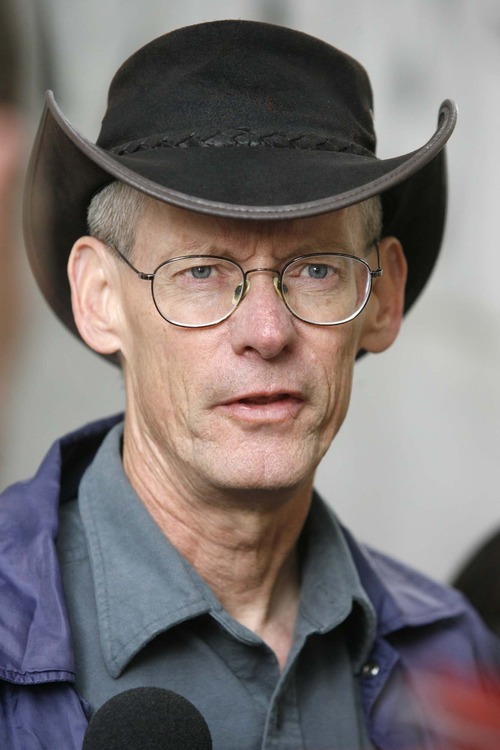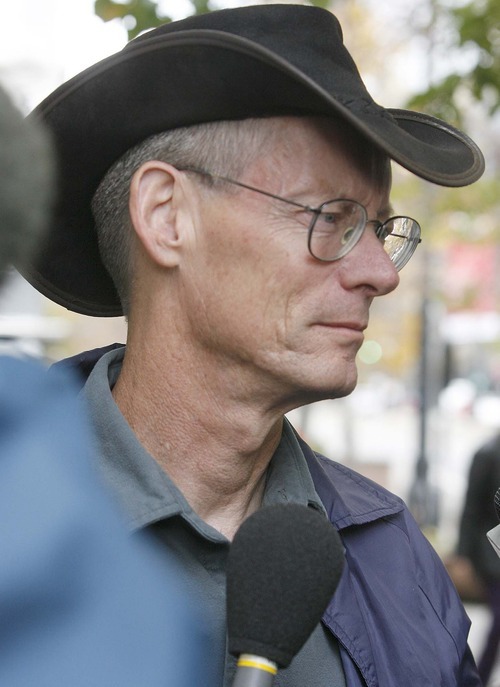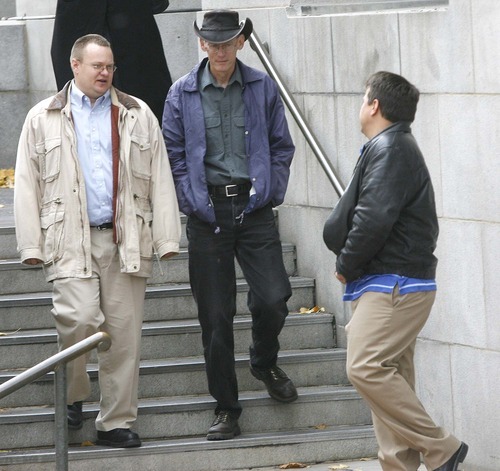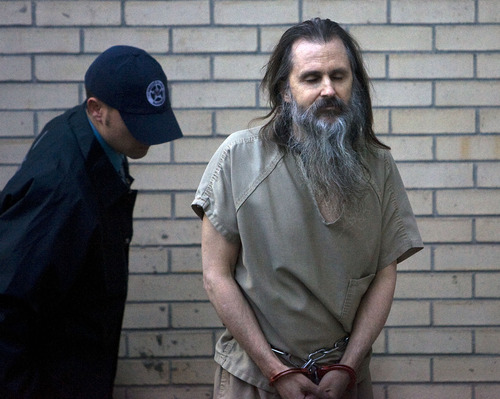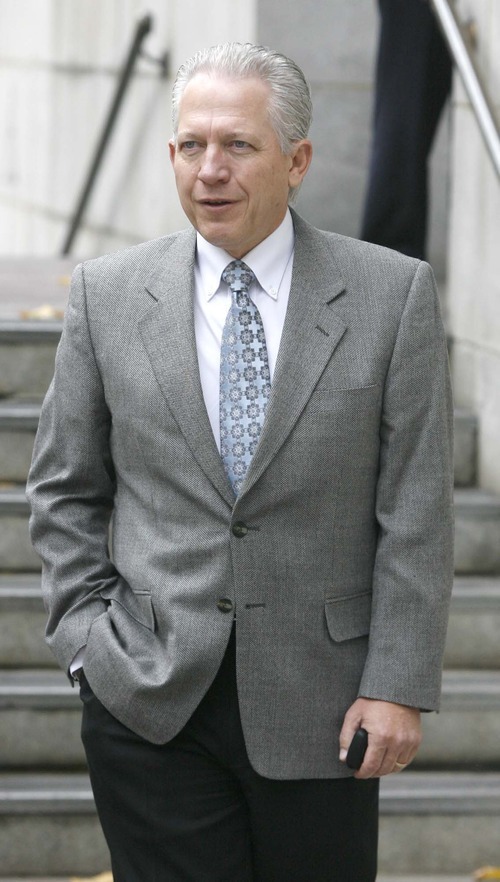This is an archived article that was published on sltrib.com in 2010, and information in the article may be outdated. It is provided only for personal research purposes and may not be reprinted.
See past coverage of the Elizabeth Smart kidnapping trial, including full transcripts of Smart's testimony, at http://www.sltrib.com/topics/mitchell.
The prosecution has rested its case against Brian David Mitchell, turning the trial over to the defense, which will try to prove Mitchell was insane in 2002 when he kidnapped Elizabeth Smart from her home at knifepoint and held her captive for nine months.
Defense attorneys on Tuesday requested a mistrial because the jury has heard unsubstantiated allegations Mitchell had sexually abused children even before Smart's abduction.
U.S. District Judge Dale Kimball denied the motion. The allegations came up in a video viewed Monday by jurors of an interrogation of Mitchell by an FBI agent and a Salt Lake City police detective after his arrest.
After entering the courtroom Tuesday, Mitchell sang Christmas carols, including "Joy to the World," "O Come All Ye Faithful" and "Silent Night." He was removed to an adjoining room with an video feed of the proceedings after he declined to stop singing.
FBI Agent George Dougherty, who continued his testimony from Monday, said under cross-examination that he talked to Mitchell in four interviews for a total of six to eight hours. The agent said Mitchell would answer questions after carefully formulating an answer, and sometimes asked questions himself.
"It wasn't necessarily a one-sided conversation," Dougherty said.
He said Mitchell told him he was approached by law enforcement four times during the nine months Smart was missing and the encounters frightened him.
"I remember he said they relied on fate to get them through those rough times," Dougherty said.
Mitchell told him they moved to San Diego to stay in a warmer place for winter.
To get money for the bus tickets, "they relied on street ministering to provide for them," Dougherty said Mitchell told him.
"Several times he referred to himself as a servant of God," Dougherty said.
When people would tell Mitchell he was crazy, Dougherty said he would reply to them, "I am not crazy; I am serving the lord."
Dougherty said he got the impression Mitchell was enjoying the limelight of the case. He heard thousands of people were reading his book online.
The prosecution showed a typed copy of Mitchell's book, "The Book of Immanuel David Isaiah." However, the copy Doughtery was familiar with was a calligraphy hand-written copy.
Dougherty said Mitchell wrote a book about himself and put himself in it.
Dougherty said passages in the book allude to martyrdom, but never actually said the word.
"They will mar my servant, but they will not take his life," said some of the passages.
He didn't say he was the Davidic king, Dougherty said, but that he was a very special person.
Dougherty also stated he has worked with the mentally ill in the past and experienced the mentally ill typically couldn't stay on task and would get easily distracted. Mitchell was not distracted.
"I could ask him specific questions, unlike the mentally ill people I dealt with where there was not a conversation," Dougherty said. "We couldn't stay in the same room, (when I would talk to mentally ill people) let alone on the same task."
He said Mitchell had the "wherewithal to and know when and when to not answer a question to incriminate him. He would use his religion as a defense mechanism," Dougherty said.
He also said when Ed Smart, Elizabeth's father, would say in news conferences that Elizabeth Smart was alive, Mitchell said he interpreted that to mean her parents knew in their heart Elizabeth was safe. Mitchell said the Smarts knew this is what God wanted.
When asked for his opinion of "The Book of Immanuel David Isaiah," Dougherty replied, "It was a mechanism for a child predator."
Dougherty testified that Mitchell's speech was not disorganized and that he did not ramble "any more than I did." In the hundreds of interviews that he's conducted, Mitchell ranked "by far, at the top of the list" in the way he answered questions carefully, he said.
The government rested its case in chief. Prosecutors can call rebuttal witnesses after the defense has presented its case.
The first defense witness was Dru White, the mission president of a Salt Lake City stake who asked Mitchell to be one of his high counselors in late 1987 or early 1988.
He said Mitchell was clean-cut and married to Wanda Barzee. The two, who did church work together eight or nine months until White was called to be a bishop, did not socialize together.
"He seemed to be very eager to do a good job. He was quiet. He didn't talk a lot," White said.
White, a friend of the Smart family, said he didn't recognize pictures of Mitchell after his arrest.
Following White, the defense called Merlin Douglas "Doug" Larsen.
Larsen worked nearly 29 years at OC Tanner, spending some of that time alongside Mitchell. He kept a journal since 1977.
Larsen considered his conversations with Mitchell as typical as he would have with any employee.
"They were just casual. He and his workstation and I had mine. Any conversation was just very, very casual," Larsen said.
However, later on Larsen and Mitchell would grow closer, and around 1989-90 he and Mitchell "hit it off real well."
"We kind of got reprimanded [by the boss] for talking to too much sometimes," Larsen said. "We had a lot of similar interest and views."
"We shared religious perspectives and beliefs that were similar at the time," Larsen said about why they became friends.
Larsen said Mitchell had served in positions in the LDS Church's elders quorum and he had positions as a clerk at the stake or ward level.
Larsen said he described Mitchell as "utterly sincere" when he would have conversations with Larsen.
"When someone shares your spiritual and religious goals ... you can tell."
Larsen said he was devoted to the Mormon religion at the time, however he thought Mitchell was more devoted than he was as the time.
The two talked about how the Davidic king would rise up in the last days, they believed it would be through the ranks of a LDS general authority.
The two also liked to follow then-LDS President Ezra Taft Benson.
"We both considered him to be a very powerful prophet," Larsen said. "He was very outspoken during his church career. We both considered him to be among the great prophets of the LDS Church."
Larsen said Mitchell had a good sense of humor. His coworker once played the role of Satan in an LDS temple ordinance service and said that afterward, the temple workers took him aside.
According to Mitchell, they said he was one of the best Lucifers they had ever seen but asked him to tone it down.
"I think he was amused by their concern because he realized he could play a good devil, he could be convincing," Larsen said.
Larsen said he and Mitchell were considered "religious fanatics" by their less religious coworkers in the department.
Mitchell shared his family history with Larsen briefly. He would talk about his parents and didn't really talk about his siblings. But there was a problem in Mitchell's life, Larsen said, and he wanted to help his dad who was falling away from the church.
"He was concerned his father was not believing in church doctrine and teachings," Larsen said.
Larsen said Mitchell described his father having a revelation that he would eventually give to the world when the time was right.
Larsen said Mitchell expressed a desire to talk to his dad and after speaking with him was sad or disappointed that he couldn't get through to him.
Mitchell told Larsen that Shirl Mitchell felt he had learned something that had transcended above anything that the church had ever taught before.
"He felt his father was blinded in his understanding and may have shot beyond the mark," Larsen said.
When talking about the past he mentioned "the first woman he hooked up with back in New York at the time and when he was being kind of wild and on LSD and stuff," Larsen said.
Had been through two marriages before marrying Wanda Barzee.
He had the marriage with his second marriage and he talked about it the most. He was admitting that part of the reason the marriage failed was his fault. He didn't completely blame his wife.
Mitchell told Larsen he and Barzee had met in therapy. He mentioned how Wanda was talented and played the organ and was older than he.
Larsen finally met Barzee at an OC Tanner outing.
"They were an interesting-looking pair. I wasn't sure what to make of her, she was quiet or kind of shy," Larsen said.
"I didn't sense any real chemistry [between the couple]," he said.
Larsen said he and Mitchell were different from their fellow OC Tanner employees. The other talked about sports, gossiped about work and famous people, told unclean stories and used crude humor, he said.
"They thought we were like two religious fanatic guys," Larsen said.
Mitchell was very confident in his views about politics and moral issues "to the point of being dogmatic and inflexible," he said. He could be pushy and off-putting, he said.
Around 1990, OC Tanner switched from playing elevator music to pop music, a genre he and Mitchell did not like, Larsen said. The two preferred classical and religious music.
There was a speaker above their heads and "we would have to listen to the same fatuous crap every day. It got really hard to deal with," said Larsen, who cut the wires to the speaker one day.
The two men also were critical of the way many LDS members behaved and of the "degrading theme" of movies. They spent a lot of time with their families and hobbies, he said.
Mitchell eventually left OC Tanner for an ironworks job after praying about it, Larsen said. He then became interested in the work of C. Samuel West and his writing on the lymphatic system.
Mitchell told him he and Barzee wanted to become full-time health missionaries for West, said Larsen, who began to think that Mitchell, based on some of his comments, might be taking medications for a psychiatric issue.
When Mitchell tried to get Larsen to make a $350 donation, he declined because money was tight. "I told him that I didn't want to donate to something I didn't understand," he said.
Mitchell said he would let him read some material that West had given him, although it shouldn't be given before payment, and he would be back again in a few weeks.
"Then I didn't see him again for four years," he said.
Soon after, some former coworkers said they saw Mitchell downtown dressed "Biblically."
"I said, you are probably mistaken," Larsen said. "I can't believe he would do that. ... Silly me."
Larsen saw Mitchell in August 1998 and didn't see him again until September 2002.
He was downtown and saw a man sitting on a box on the sidewalk, and the man said, "Sir, could you help me?"
"I could instantly recognize him," Larsen said. "I walked over to him and said, 'Brian,' and put out my hand."
Mitchell didn't grab it, "he just said he had needs, many needs," Larsen said.
"He didn't look crazy, he just looked like he could be tired," he said.
"I told him I had needs too, I wanted to know what he had been doing [all this time]," he said, but Mitchell just walked away. "I knew he knew me."
Larsen followed Mitchell for about a block.
"He wasn't going to answer me, so I grabbed him physically by the left bicep," Larsen said.
Mitchell took a big sigh and looked away.
"I thought he was going to hit me," Larsen said.
So Larsen said, "You gave that guy a 'God bless you' for 50 cents. Will you give me five minutes of your time for $5?"
Mitchell just looked at him and the new money in his hand and said, "The Lord be praised. God bless you."
"I said, 'I will pray for you,'" Larsen said and then started to walk away. Mitchell turned and over his shoulder said, "and I will pray for you."
Larsen said at work his supervisor questioned Mitchell about his singing and would discourage him, and Mitchell would stop singing.
Mitchell never talked of any visions or hearing voices.
"Usually people describe it as inspiration or an answer to prayer. Brian would refer to it as revelation," Larsen said.
Larsen wrote his own self-published novel, a religions sci-fi fantasy about a comet approaching Earth prior to Jesus Christ's second coming. In this book, he wrote about an antichrist that was an excommunicated Mormon. The hero was a faithful Mormon. He shared it with Mitchell, who he said didn't like one of the characters: A women who was going to prostitute herself to distract the faithful Mormon.
"He didn't think God would ever ask a girl to do that," Larsen said.
Prosecutor David Backman asked Larsen to clarify his remark.
"He didn't think a god would ask a girl to give up her virtue?" he said.
"Right," Larsen replied.
Larsen wasn't subpoenaed until late last week, so he had paid attention to Elizabeth Smart's testimony for several days. He said part of her testimony reminded him of the book he wrote.
"Her testimony was nearly identical to the very thing he [Mitchell] was objecting to," Larsen said.
Larsen was then excused.
The defense then Karl West, the son of C. Samuel West, who promoted the non-traditional medical practice of lymphology. His father died in September 2004.
West said Mitchell and Barzee stayed at his parents' Orem home periodically. When the weather was warm, they lived in a teepee in the back yard, he said.
Mitchell was clean cut when he first met him, but had a beard and wore clothing like an "Israelite" by 1999, West said. He said Mitchell appeared sincere in his religious beliefs.
Friction developed between his father and Mitchell, who wanted to be called David, over gospel doctrine.
There came a point when Mitchell and Barzee would come and go without saying anything to the family, West said.
The next time he saw Mitchell, he was "yelling at the sidewalk" in front of the house, he said.
The defense asked what West recognized once Mitchell came back to the house after some time.
"He was off his rocker," West said.
There was a distinct change in Mitchell's behavior.
"I didn't understand it; I was perplexed," West said about Mitchell's new demeanor toward the West family. "I didn't know what we did wrong."
West described two personas of Mitchell.
"There are only two ways I have seen him: clean-cut, and then the other way around, dressed up as an Israelite," West said.
West said all the things Mitchell did were just not normal, but after seeing who he was on the news after Smart's disappearance, things started making more sense.
"None of these things made sense until I saw him on the news drinking a beer," West said. "I started realizing he wasn't the person I thought he was."
"So are you saying he fooled you?" prosecutor Felice Viti asked.
"Yeah ... Yeah ... definitely. " West said.
West's brother, Benjamin West, also said Mitchell's personality and appearance changed.
Mitchell began dressing in robes and took on the appearance of Jesus Christ, he said. He first went by David and later wanted to be called Immanuel. Then, he claimed to be a prophet, West said.
Mitchell said he had been called by God to "walk across the States" and see how people treated a poor person but was unwilling to help others himself, he said.
"He seemed like he never wanted to do anything to help anyone," West said.


